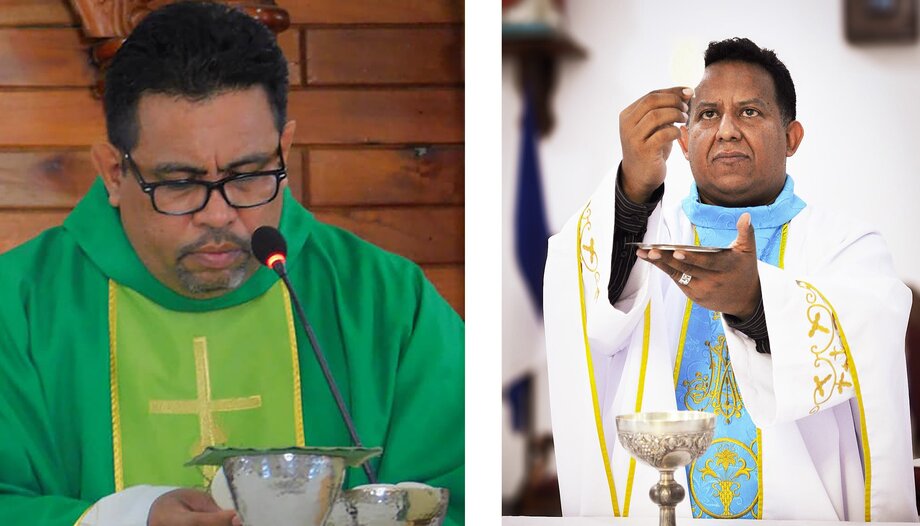First came the agreement with the Holy See for the release of a dozen religious who had been prosecuted for "various reasons". Then, the revocation of the juridical personality imposed on the Order of Franciscan Friars Minor of the Seraphic Province of Assisi in Nicaragua. This also affected 16 NGOs, while 8 others voluntarily decided to cease their activities to protect their properties. The measure establishes that the assets, both movable and immovable, of the sanctioned organizations will pass into the hands of the State.
More persecution
Over the course of a week, the government led by Daniel Ortega has further confirmed its intentions to persecution of the Catholic Churchdespite negotiations that led the director of the Vatican Press Room, Matteo Bruni, to confirm that the Holy See had been asked to receive the newly released priests. "The Holy See has accepted," he responded to reporters' questions. "They will be received by an official of the Secretariat of State in the afternoon," Bruni continued, "and will be housed in some facilities of the Diocese of Rome."
In a communiqué, the Nicaraguan government affirmed that "this agreement reached with the intercession of the high authorities of the Catholic Church of Nicaragua and the Vatican represents the will and permanent commitment to find solutions, recognizing and encouraging the faith and hope that always animate the Nicaraguan believers, who are the majority". The released priests are Manuel Salvador García Rodríguez, José Leonardo Urbina Rodríguez, Jaime Iván Montesinos Sauceda, Fernando Israel Zamora Silva, Osman José Amador Guillén and Julio Ricardo Norori Jiménez.
In addition to Cristóbal Reynaldo Gadea Velásquez, Álvaro José Toledo Amador, José Iván Centeno Tercero, Pastor Eugenio Rodríguez Benavidez, Yessner Cipriano Pineda Meneses and Ramón Angulo Reyes. The list does not include Monsignor Rolando Alvarez, sentenced last February to more than 26 years in prison for "treason" after refusing to be expelled from Nicaragua to the United States along with 222 other political prisoners. The measure against the Franciscan Order was announced by the Ministry of the Interior of Managua, alleging administrative irregularities.
Expulsion of orders
According to state authorities, the Franciscan friars did not comply with "laws related to financial reporting, boards of directors, details of their donations and the identity and nationality of their donors". After the Jesuits, the Missionaries of Charity of St. Teresa of Calcutta and many other Catholic institutions, it is now the Franciscan Order that is the victim of the regime in Nicaragua. According to Tempi, the St. Francis of Assisi Institute is not the first school confiscated by the Sandinista regime.
Last May, Ortega "appropriated" the Susana López Carazo School, one of the emblematic works of the Dominican Sisters of the Annunciation in the department of Rivas, a month after having expelled three nuns of the same congregation who also ran a residence. And five months ago, the dictatorship took by force the Technical Institute Santa Luisa de Marillac, property of the congregation of the same name, in addition to appropriating the only Catholic higher education center in San Sebastián de Yalí.
The hatred towards the Catholic Church by Ortega and his wife, Rosario Murillo, who is also vice president, began after the April 2018 protests, repressed in blood and fire by the police, when the archbishop of Managua, Sergio Baez (currently in exile in Miami), Monsignor Alvarez and many other priests supported by the Nicaraguan Episcopal Conference (CEN) decided to support the students massacred by Sandinismo (between 350 and 500 dead).
The IACHR demands the release of prisoners
The opposition proposed Friday, October 27, Religious Freedom Day, to demand freedom for Nicaragua, the release of Monsignor Rolando Alvarez and all political prisoners. A little over a month ago, the Inter-American Commission on Human Rights (IACHR) reiterated its call to the Government of Nicaragua and its president, Daniel Ortega, to "cease attacks on religious freedom, the persecution of the Catholic Church and to free all persons arbitrarily deprived of their liberty".
The IACHR also refers to the arrest of the priest Osman José Amador by the National Police of the Estelí diocese and former director of the organization Cáritas Estelí, who was forcibly detained by state agents. "So far there is no information about the reasons for the arrest, the legal situation or the whereabouts of the priest," it reads. The arrest took place on September 8. In addition, the deprivation of liberty of priests Eugenio Rodríguez Benavides and Leonardo Guevara Gutiérrez, investigated for their work in Cáritas Estelí, is denounced.
The organization points out that since 2022 it has observed that the persecution against the Catholic Church continues to worsen in a context of closure of civic and democratic space: "There are arbitrary arrests, detentions and expulsions from the country of priests and religious without guaranteeing due process, as well as the expropriation of their properties". It is also recalled that in May the State ordered the freezing of the bank accounts of at least three of the nine dioceses of the Catholic Church for alleged illicit activities related to money laundering. "In a country with a majority of the population professing the Catholic religion, such as Nicaragua, the state policy of suppression of civic space has also resulted in the injury of the religious freedom of the population," concludes the IACHR communiqué.








